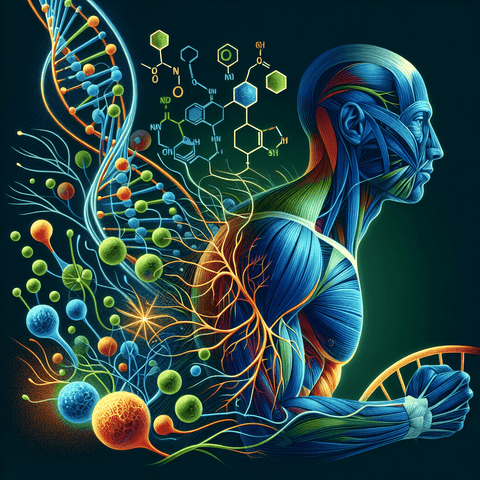Understanding B12 Deficiency and Its Role in Muscle Health
Vitamin B12, also known as cobalamin, is one of the essential B vitamins that plays a fundamental role in several physiological processes in the human body. Among its many functions, B12 is pivotal in the maintenance of the central nervous system, the synthesis of red blood cells, and DNA production. However, its role in muscle health—though often overlooked—is equally vital. Muscle function depends heavily on proper nerve signaling and energy metabolism, both of which are supported directly by adequate levels of vitamin B12. In this section, we will delve into the biological importance of B12 and lay the foundation for understanding how its deficiency can disrupt muscle performance.
Vitamin B12 functions as a cofactor in the synthesis of methionine and in the metabolism of certain fatty acids and amino acids. These processes are integral to producing energy and maintaining healthy myelin—the protective sheath around nerves. When B12 levels are insufficient, these metabolic functions are disrupted, leading to a range of consequences, especially concerning muscle coordination, stamina, and recovery.
Unlike other water-soluble vitamins, B12 is stored in the liver in substantial amounts, which means deficiency typically develops gradually. It can resurface due to several causes, including poor dietary intake—particularly with vegan and vegetarian diets—malabsorption syndromes such as pernicious anemia or Crohn’s disease, or aging-related decreases in intrinsic factor levels. When left untreated, B12 deficiency can lead to irreversible neurological and muscular damage.
Nutritional supplements provide a reliable line of defense against B12 deficiency. Oral supplements are readily available over the counter and come in various forms including tablets, sublingual lozenges, and sprays. For those with absorption issues, intramuscular injections may be necessary. At Topvitamine, a wide selection of B-complex vitamins and standalone B12 products can support overall health—including robust muscle function—especially when coordinated with other essential nutrients like magnesium and vitamin D.
The relationship between adequate B12 status and muscle function rests primarily on the vitamin's role in nerve integrity and erythropoiesis (red blood cell formation). As nerves control every aspect of muscle contraction and coordination, even mild deficiencies can result in muscle weakness, tremors, or balance issues. Furthermore, B12 is crucial for optimal oxygen delivery to muscle tissues through red blood cells, enhancing stamina and performance during physical activity.
In summary, understanding the biological role of B12 is paramount for recognizing how its deficiency compromises muscle health. This nutrient’s multifaceted role in maintaining energy metabolism, nerve function, and blood cell production forms the core of efficient muscular performance. Ensuring that your body has sufficient B12—whether through diet or supplementation—can prevent a cascade of issues that begins as fatigue and poor coordination and potentially leads to muscle atrophy and long-term decline.
Neurological Symptoms of B12 Deficiency That Affect Muscle Performance
The connection between vitamin B12 deficiency and neurological dysfunction is well-documented. Since B12 is essential for maintaining the health of neurons through its role in methylation processes and myelin production, deficiency symptoms often manifest first in the nervous system before progressing to muscular issues. Understanding how these neurological signs specifically impair muscle performance offers a deeper insight into the cascading effects of this essential nutrient’s deficiency.
One of the earliest signs of B12-related neurological impairment is numbness or tingling (paresthesia), particularly in the limbs. This occurs due to demyelination of peripheral nerves. Demyelination slows down the conduction of electrical impulses along nerves, which in turn affects the precision of muscle movements. Individuals may experience difficulty with coordination, balance, and fine motor skills—a troubling concern for both athletes and the aging population alike.
Another noteworthy neurological symptom is ataxia, or the loss of full control of bodily movements. Ataxia may lead to an unsteady gait, frequent falls, and a marked decrease in the coordination required for daily activities. Muscle reflexes may become sluggish, and fasciculations (muscle twitches) are also common. These symptoms directly arise from the written deterioration of sensory and motor neurons caused by prolonged B12 insufficiency.
Mental clarity and cognition are also impacted. Brain fog, memory lapses, and even mood disturbances such as depression and anxiety can accompany muscle weakness, compounding the overall impact of the condition. These cognitive effects can make it more challenging for individuals to maintain any form of physical activity or engage in rehabilitation exercises aimed at regaining muscle strength.
Neurological health is inherently linked to muscle strength, as intact nerve signaling is required for initiating and maintaining muscle contractions. When neurons are compromised, so too is the ability to generate sufficient muscular force or maintain endurance for prolonged periods. In fact, many cases of unexplained muscle weakness can be traced back to underdiagnosed B12 deficiency, especially among older adults or vegans with restricted dietary choices.
Supplementation with vitamin B12 can often help reverse neurological symptoms, especially when deficiency is caught early. In more advanced cases, it may arrest the progression of symptoms but not fully restore neural integrity. This highlights the importance of early detection and preventive strategies, including the use of high-quality supplements as found in product assortments at Topvitamine, where synergistic nutrients like vitamin D may further enhance neuromuscular function and immune resilience.
Ultimately, maintaining adequate B12 levels is not just about avoiding fatigue and feeling good day-to-day—it’s a matter of preserving the essential communication system between the brain and muscles. Whether you are managing a neuromuscular condition, recovering from injury, or simply focused on long-term wellness, B12 should be considered a cornerstone of your nutritional strategy.
Muscle Weakness Causes Associated with B12 Deficiency
Muscle weakness is one of the more conspicuous symptoms of vitamin B12 deficiency, often forming the bridge between neurological impairment and musculoskeletal degradation. While weakness may initially be subtle—experienced as a general lack of energy or sluggish performance—its progression can lead to significant mobility limitations and reduce one’s ability to perform everyday tasks. This section explores the mechanisms through which B12 deficiency leads to reduced muscle strength and endurance.
The key pathway linking B12 deficiency to muscle weakness lies in its disruptive influence on neuromuscular transmission. As discussed earlier, B12 plays a critical role in the maintenance of myelin. Myelin ensures rapid and accurate transmission of electrical impulses through motor neurons to muscle fibers. Degradation of myelin impairs communication, causing delay or failure in muscle activation. As a result, everyday activities such as walking, lifting objects, or climbing stairs may start to feel unusually draining for affected individuals.
Another pathway is related to B12’s impact on red blood cell formation. Insufficient red blood cells equate to decreased oxygen delivery to muscle tissues. This condition, known as megaloblastic anemia, can cause muscles to tire quickly due to their oxygen dependency during aerobic activity. Prolonged oxygen deprivation further contributes to the decline in muscle tone and performance, particularly under stressful or physically demanding conditions.
If left untreated, chronic B12 deficiency can progress to muscle atrophy—the actual shrinking of muscle mass. Atrophy occurs when muscle fibers are under-stimulated or poorly nourished, conditions easily precipitated by impaired nerve function and decreased physical activity due to weakness. For elderly individuals or those recovering from immobilizing conditions, this can dramatically accelerate muscle loss, making rehabilitation more difficult.
Supplementing with vitamin B12, particularly in cases where dietary intake is insufficient or absorption is compromised, can have a restorative effect on muscle function. While oral B12 supplements offer convenience and compatibility with most health regimens, injectable forms may be necessary for individuals with severe deficiency or compromised gastrointestinal systems. A broader supplementation plan might also include magnesium or Omega-3 fatty acids, such as those available from Topvitamine, to further support neuromuscular health and reduce inflammation.
Incorporating B12-rich foods into one’s diet can also help, though animal products like meat, eggs, and dairy are the primary natural sources—something vegans and vegetarians must address through fortified foods and supplements. Continued muscular weakness, even with adequate exercise, should raise red flags prompting a complete nutritional assessment, with B12 levels being a key parameter.
Overall, muscle weakness from B12 deficiency is more than a symptom—it is a sign of decline in the body’s neuromuscular integrity. Early intervention, proper diagnosis, and a commitment to supplementation where needed can dramatically improve outcomes and restore strength in affected individuals.
Vitamin B12 Impact on Muscle Recovery and Growth
Muscle recovery and growth, or hypertrophy, are complex physiological processes that involve immune response, protein synthesis, cellular repair, and hormonal signaling. While nutrients such as protein and creatine often dominate discussions about muscle development, vitamin B12 has a pivotal yet underappreciated role in this equation. From enhancing oxygen transport to catalyzing enzymatic reactions that drive tissue repair, B12 is a crucial player in muscle regrowth—particularly after exercise or injury.
Vitamin B12 supports muscle recovery primarily through its role in DNA synthesis and cell division. During muscle growth, satellite cells (a type of stem cell involved in muscular repair) proliferate around damaged fibers, facilitating repair and new muscle formation. B12 is essential for the activation of these satellite cells through its role in DNA replication. In its absence, these regeneration processes are slowed or halted, impairing post-exercise recovery and overall gains in muscle mass.
Additionally, B12 ensures the efficient conversion of the amino acid homocysteine into methionine—a precursor to S-adenosylmethionine (SAMe), which plays a role in cellular growth and methylation reactions. Elevated homocysteine levels, which occur during B12 deficiency, are also associated with increased inflammation and oxidative stress—factors that hinder muscle healing and contribute to delayed onset muscle soreness (DOMS).
Within this context, B12 is closely linked to protein metabolism and neuromuscular performance. Adequate B12 supports the metabolic processing of nutrients required to rebuild muscle protein structures, making it indispensable for athletes, fitness enthusiasts, and individuals undergoing physiotherapy.
Supplementation strategies aimed at enhancing muscle regeneration ideally pair B12 with other synergistic nutrients such as Vitamin C and iron (for red blood cell function), Vitamin D (for calcium metabolism), and magnesium. Together, these nutrients build an optimal internal environment for muscular strength and stamina. For those seeking high-quality supplementation, options available at Topvitamine provide a convenient and reliable source of these nutrients in bioavailable forms safe for regular use.
In post-surgical recovery scenarios or after injury, B12 plays a particularly vital role. Prolonged bed rest and inactivity can cause muscle disuse atrophy, which requires targeted nutritional and physical interventions to reverse. Ensuring that the body has sufficient reserves of B12 accelerates the healing process and enhances muscle regrowth by increasing cellular energy production via the Krebs cycle and boosting overall vitality.
In sum, vitamin B12 is a catalyst—not just for energy and nerve health—but also for the biological processes that drive muscle repair and hypertrophy. Meeting daily requirements through food and supplements can empower your body to recover more efficiently and respond better to physical training stimuli, ensuring long-term muscle health and performance.



